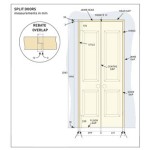Where Can I Study Interior Design?
Aspiring interior designers have a variety of educational pathways available, ranging from traditional university degrees to specialized vocational programs and online courses. Selecting the right path depends on individual career goals, learning style, and financial considerations. This article explores the diverse options available for those seeking to study interior design.
Universities and Colleges: Bachelor's and Master's degrees in interior design offer comprehensive education in design principles, history, technical drawing, construction methods, and business practices. University programs often include studio work, allowing students to develop practical skills and build a portfolio. Accreditation by organizations like the Council for Interior Design Accreditation (CIDA) signifies a program's adherence to rigorous academic standards and can enhance career prospects. A bachelor's degree is typically the minimum requirement for entry-level interior design positions, while a master's degree can open doors to advanced roles and specialization.
Specialized Design Schools and Institutes: Numerous institutions focus exclusively on art and design, offering specialized interior design programs. These schools often boast experienced faculty with strong industry connections, providing students with valuable networking opportunities and practical insights. While some may offer degree programs, others provide diplomas or certificates, focusing on specific areas like kitchen and bath design, sustainable design, or computer-aided design (CAD). Researching the specific curriculum and faculty expertise is crucial when considering these specialized institutions.
Community Colleges and Vocational Schools: Associate degrees and certificate programs at community colleges and vocational schools offer a more affordable and accessible entry point into the field. These programs typically focus on technical skills and practical application, preparing students for entry-level positions or assisting established designers. They can also serve as a stepping stone to a bachelor's degree program. While they might not offer the same breadth of theoretical knowledge as university programs, they can provide a solid foundation in core design principles.
Online Interior Design Programs: Online learning platforms provide increased flexibility for individuals juggling work or family commitments. Online programs can range from short courses focusing on specific software or design styles to comprehensive degree programs. Accreditation and the reputation of the providing institution are critical factors to consider when evaluating online programs. Potential students should also assess the level of interaction with instructors and other students, as well as the availability of resources and support services.
Continuing Education and Workshops: For practicing designers or those seeking to specialize in a particular area, continuing education courses and workshops offer opportunities to stay updated on industry trends and acquire new skills. These can include short-term programs focusing on specific software, sustainable design practices, or project management techniques. Professional organizations and design institutions often offer these specialized training opportunities.
Factors to Consider When Choosing a Program: Selecting the right interior design program requires careful consideration of several factors. Accreditation ensures the program meets industry standards and can impact licensing requirements. Curriculum should align with individual career goals, whether it’s residential design, commercial design, or a specialized niche. Faculty expertise and industry connections can significantly enhance the learning experience. Location and program format (on-campus, online, or hybrid) should align with lifestyle and logistical needs. Finally, cost and financial aid options are crucial factors that require thorough research and planning.
Licensing and Certification: Regulations for practicing interior design vary by jurisdiction. Some regions require designers to obtain a license, which typically involves completing a CIDA-accredited degree program, passing the National Council for Interior Design Qualification (NCIDQ) exam, and accruing a specific amount of work experience. While certification is not always mandatory, it demonstrates professional competency and can enhance career prospects. Researching the specific requirements in the intended practice location is essential.
Building a Portfolio: A strong portfolio is crucial for showcasing design skills and securing employment. Educational programs often incorporate portfolio development into the curriculum, providing opportunities for students to create design projects and showcase their abilities. Internships and freelance work can also contribute valuable pieces to a portfolio. A well-curated portfolio should demonstrate a range of skills, design styles, and project types.
Networking and Professional Organizations: Joining professional organizations like the American Society of Interior Designers (ASID) or the International Interior Design Association (IIDA) can provide valuable networking opportunities, access to industry resources, and continuing education opportunities. Attending industry events, conferences, and workshops allows aspiring designers to connect with established professionals and learn about current trends.
Research and Exploration: Thorough research is paramount when choosing an interior design program. Visiting campuses, attending online information sessions, and connecting with current students and alumni can provide valuable insights into the program's culture, resources, and career support. Exploring different program options and evaluating them against individual career goals and learning preferences is crucial for making an informed decision.

Interior Design Anne Arundel Community College

Can You Really Study Interior Design National Academy

Top Interior Design Training Tips How To Hone Your Craft

Interior Design Byu Independent Study

Study Room Interior Design Inspiring Idea

Study Room Décor Ideas To Help You Focus Beautiful Homes

10 Good Reasons To Study Interior Design Ivs School Of

A Guide To Study Room Design Styles Designcafe

Study Interior Designing After 12th At Inifd Saltlake And See Yourself As A Successful Designer

3 Reasons Why You Should Study Interior Design Open College
Related Posts








